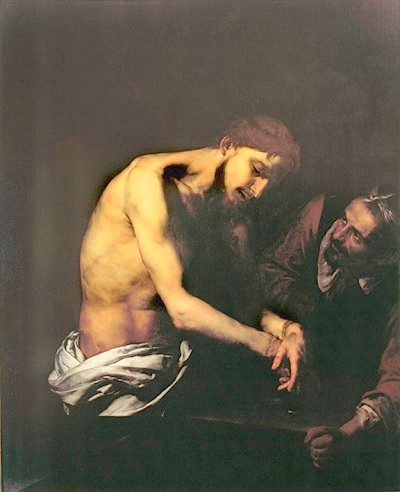
Flagellation of Christ
Jusepe de Ribera, 17th century
My dear friends,
As we reflect on the profound verses of Isaiah 50:4-9a during this solemn week, we are invited to contemplate the path of the Bodhisattva alongside the suffering of Christ. These scriptures not only foreshadow the passion of Jesus but also echo the Bodhisattva ideal of enduring hardship for the benefit of all beings. Let us open our hearts to the teachings of compassion, self-sacrifice, and unwavering faith that are vividly portrayed in these texts.
that I may know how to sustain the weary
with a word.
Morning by morning he wakens --
wakens my ear to listen
as those who are taught.
- Isaiah 50:4
This passage captures the essence of the Bodhisattva's journey - to possess the wisdom and compassion to guide and uplift those who suffer. Like a teacher endowed with divine speech, we are reminded of our calling to listen attentively to the teachings and awaken each day with a renewed commitment to serve others. The 'tongue of a teacher' is not just for imparting knowledge but for offering solace and strength to the weary and despondent.
I gave my back to those who struck me, and my cheeks to those who pulled out the beard;
I did not hide my face from insult and spitting.
- Isaiah 50:5-6
Here, the prophet's willingness to embrace suffering without resistance mirrors the Bodhisattva's vow to endure hardships for the sake of all beings. It speaks to the profound act of accepting one's calling with a heart full of compassion and resilience. This teaches us the virtue of patience and the strength found in surrendering to a higher purpose beyond our own comfort and desires.
therefore I have set my face like flint, and I know that I shall not be put to shame;
he who vindicates me is near.
- Isaiah 50:7-8a
In these words, we find a powerful declaration of faith and trust in divine assistance, reminiscent of the Bodhisattva's unshakeable resolve to benefit others, despite challenges. Setting one's face 'like flint' symbolizes the unwavering determination to follow through with one's mission, bolstered by the knowledge that righteousness will ultimately be upheld. This reinforces the importance of steadfastness and courage on the spiritual path.
Who are my adversaries? Let them confront me.
- Isaiah 50:8b
This bold challenge to adversaries speaks to the spiritual warrior's heart, embodying the courage to face opposition with integrity and honor. It is a call to stand firm in our convictions and to confront challenges with a spirit of openness and readiness. The Bodhisattva path too is marked by such bravery, where obstacles are seen not as deterrents but as opportunities for growth and deepening compassion.
- Isaiah 50:9a
This final verse reaffirms the profound trust in divine vindication, a theme central to both the Biblical and Bodhisattva paths. It encapsulates the ultimate faith in righteousness and the moral universe, where true help and support come from aligning with divine will and purpose. As spiritual practitioners, we are encouraged to maintain our integrity and righteousness, trusting that our spiritual journey is supported by a higher power.
In contemplation of these verses, we see a remarkable harmony between the path of the Bodhisattva and the teachings of Isaiah. Through enduring trials with grace, maintaining unwavering faith, and serving others with compassion, we walk a path that leads to true liberation and enlightenment. May this Holy Week inspire us to deepen our spiritual practice, embrace our shared humanity, and cultivate a heart full of love and compassion for all beings.